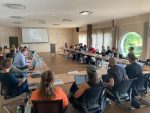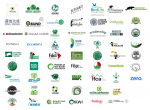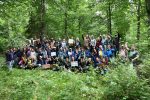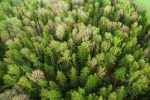Cover photo: Peter Steudtner / Mozambique Coordination Group
The bioeconomy has so far been a niche debate that essentially has its place in scientific and political circles. To the general public, however, the term is largely unknown. That is why a photo exhibition by denkhausbremen clarifies what the bioeconomy is about and shows possible consequences for the countries of the Global South.
The stakes are high: the bioeconomy involves nothing less than the transformation of our economy. Coal, natural gas and oil are to be left in the ground. Accordingly, the economic system of the future is to be based solely on biomass, which means renewable resources. Ultimately, the great promise of the bioeconomy is to counteract climate change and the extinction of species.
As nice as the bioeconomy sounds in theory, it has not yet been clarified, for example, how the high demand for biomass is to be met, especially since the land area for the additional cultivation of renewable resources is limited worldwide. Politicians and researchers are mainly looking in the direction of industrial agriculture and forestry and the import of biomass from countries in the Global South. Already today this is connected to human rights violations, the disregard of land rights and devastating environmental destruction in South America, Africa and Asia. Sugar cane or oil palms are now growing in huge monocultures on areas formerly covered by species-rich forests in order to produce biodiesel or bioplastics for the European market. Regardless of this, the global forest ecosystems are already depleted by the high demand for wood. It is to be feared that this state will continue to deteriorate dramatically and that the exploitation of people and nature in the name of the bioeconomy will reach new dimensions.
The exhibition of denkhausbremen deals with this subject. Impressive photographs from partner organizations such as f.ex. Save Our Borneo, Repórter Brasil, KoordinierungsKreis Mozambique or Greenpeace as well as from the denkhausbremen photo archive show the social and ecological impacts of biomass production. Possibilities for a socially just and ecologically sustainable bioeconomy and options for action for each individual are also addressed within the exhibition.
The photo exhibition will be opened in Bremen in December 2021 with a supporting program and lectures. Afterwards, it will move to other locations in Bremen. Those who do not have the opportunity to see the exhibition on site will also find a lot of information on the topic in the form of a visual story on the denkhausbremen website in spring 2022.
Questions about the exhibition? Feel free to contact Jana Otten.
Funding note:
The project “On the wrong track – the devastating consequences of the bioeconomy in countries of the Global South” is funded by ENGAGEMENT GLOBAL with funds from the BMZ, by the Senate Chancellery / Ref. 32 – Development cooperation of the state of Bremen and the environmental foundation Greenpeace.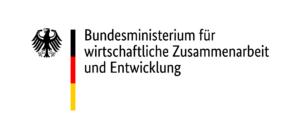
![]()

The authors of denkhausbremen are solely responsible for the content of this publication; the positions presented here do not reflect the position of Engagement Global or the Federal Ministry for Economic Cooperation and Development.


